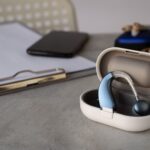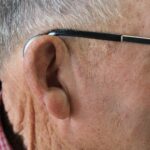Taking care of your hearing isn’t just about hearing better. Recent studies show a significant link between untreated hearing loss and an increased risk of cognitive decline, including dementia and Alzheimer’s. If you or a family member have noticed changes in hearing, this article will help you understand why acting early can make a difference to your brain health.
The good news is that detecting and treating hearing loss early can significantly reduce these risks. At Clinicaudio, we offer free, personalized hearing tests to help you protect both your hearing and your cognitive well-being.
A timely check-up can help prevent major problems, including cognitive decline.
What is hearing loss and why can it go unnoticed?
Hearing loss, or hypoacusis, is a decrease in the ability to hear sounds. It can be mild, moderate, severe, or profound, and affects millions of people worldwide.
The problem is that many people don’t realize they have it, as it usually develops gradually.
-
The most common signs include:
-
Difficulty following conversations, especially in noisy environments
-
Ask for frequent repeats
-
Turning up the volume on the television or radio more than usual
-
Feeling that others are not vocalizing clearly
-
Avoid phone calls or social gatherings
These signs may seem normal over time, but ignoring them can have consequences beyond communication. Untreated hearing loss overloads the brain, affects social life, and, according to science, increases the risk of dementia.
The relationship between hearing loss and dementia: what science says
The link between hearing loss and cognitive decline has been the subject of numerous studies in recent years. The data is compelling: people with hearing loss have a significantly higher risk of developing dementia compared to those with healthy hearing.
According to a study published in JAMA, people with mild hearing loss are almost twice as likely to develop dementia as those with normal hearing. This risk triples with moderate hearing loss and increases fivefold with severe hearing loss.
Furthermore, research from the Pasqual Maragall Foundation indicates that hearing loss can be an early sign of dementia development, and that both conditions share common neuropathological factors. Other studies conducted in Spain highlight that hearing loss accelerates cognitive aging by up to 40%.
Don’t wait for symptoms to worsen. At Clinicaudio, we perform comprehensive hearing evaluations and provide results the same day.
Mechanisms of bonding
But why does this happen? Experts have identified three main mechanisms that explain the relationship between hearing and brain health:
Less auditory stimulation
When the brain receives fewer auditory stimuli, certain areas atrophy. Lack of auditory stimulation reduces activity in the temporal lobe, a key region for speech processing, memory, and cognitive functions. Without this constant “brain exercise,” the brain loses its responsiveness.
Social isolation
People with hearing problems tend to withdraw from social situations. They find it difficult to follow conversations, feel excluded, and, over time, prefer to avoid gatherings and meetings. This social isolation is a well-documented risk factor for depression, loneliness, and cognitive decline.
Extra cognitive load
Listening with difficulty requires considerable mental effort. The brain works twice as hard to decipher sounds, interpret words, and fill in the gaps in information. This overexertion consumes cognitive resources that would normally be allocated to memory, attention, and other executive functions, accelerating mental fatigue.
Can the risk be reduced? Evidence on the use of hearing aids and early detection
Here’s the best news: yes, the risk can be reduced. Various scientific studies have shown that the use of hearing aids and early detection of hearing loss can slow cognitive decline and improve quality of life.
Research published in Maturitas revealed that people with hearing loss who do not use hearing aids have a 69% higher risk of developing dementia compared to those who do use them. Another study by Harvard Health confirmed that hearing aid users have fewer memory and thinking problems than those who do not use them.
Hearing aids do more than just amplify sound. They keep the brain active, reduce cognitive overload, and facilitate participation in social activities, all of which are protective factors against dementia. In addition, current models include advanced technology that automatically adapts to different environments, improving the hearing experience at all times.
The key is early detection. The sooner hearing loss is diagnosed and treated, the better the results. That’s why at Clinicaudio we offer comprehensive, free hearing tests tailored to your individual needs.
Hearing aids not only improve your hearing, they also protect your memory. Find out which model would be best for you.
Practical recommendations for protecting hearing and cognitive health
Protecting your hearing is protecting your brain. Here are some specific actions you can take today:
Get your hearing checked regularly.
Especially if you are over 50 or have noticed changes in your hearing ability. A professional evaluation can detect problems before they become serious.
Practice good ear hygiene
Avoid prolonged exposure to loud noises, wear hearing protection in noisy environments, and clean your ears without using cotton swabs.
Maintain an active social life
Participate in gatherings, converse with friends and family, and attend community events. Social interaction stimulates the brain and prevents isolation.
Consider using hearing technology
Modern hearing aids are discreet, comfortable, and highly effective. At Clinicaudio, we work with the best brands and offer personalized solutions based on your lifestyle, budget, and degree of hearing loss.
Take care of your overall health
Monitor your blood pressure, maintain a balanced diet, exercise regularly, and manage stress. All of these habits benefit both your hearing and your cognitive health.
Invest in your hearing and brain health
The link between hearing loss and dementia is real, but so is the opportunity to reduce that risk. Taking care of your hearing means taking care of your brain, your memory, and your quality of life.
At Clinicaudio, we understand that every person is unique. That’s why we offer free hearing tests, ongoing support, and personalized solutions with hearing aids from the best brands. Don’t wait for hearing problems to affect your cognitive well-being.
Which hearing aid is right for you?
Everyone has different hearing needs. At Clinicaudio, we help you choose the ideal hearing aid based on your level of hearing loss, lifestyle, and aesthetic preferences. From invisible devices to rechargeable models with Bluetooth connectivity, we will find the perfect solution for you.
Grants and financial aid available
Yes, there are subsidies and public assistance available for the purchase of hearing aids in Spain. Our team will advise you on the options available in your autonomous community and help you with the necessary paperwork to access this assistance.
Cost should not be a barrier to hearing well. Find out how to access public assistance, subsidies, and financing plans: Guide 2025: How to finance your hearing aids and improve your hearing.














